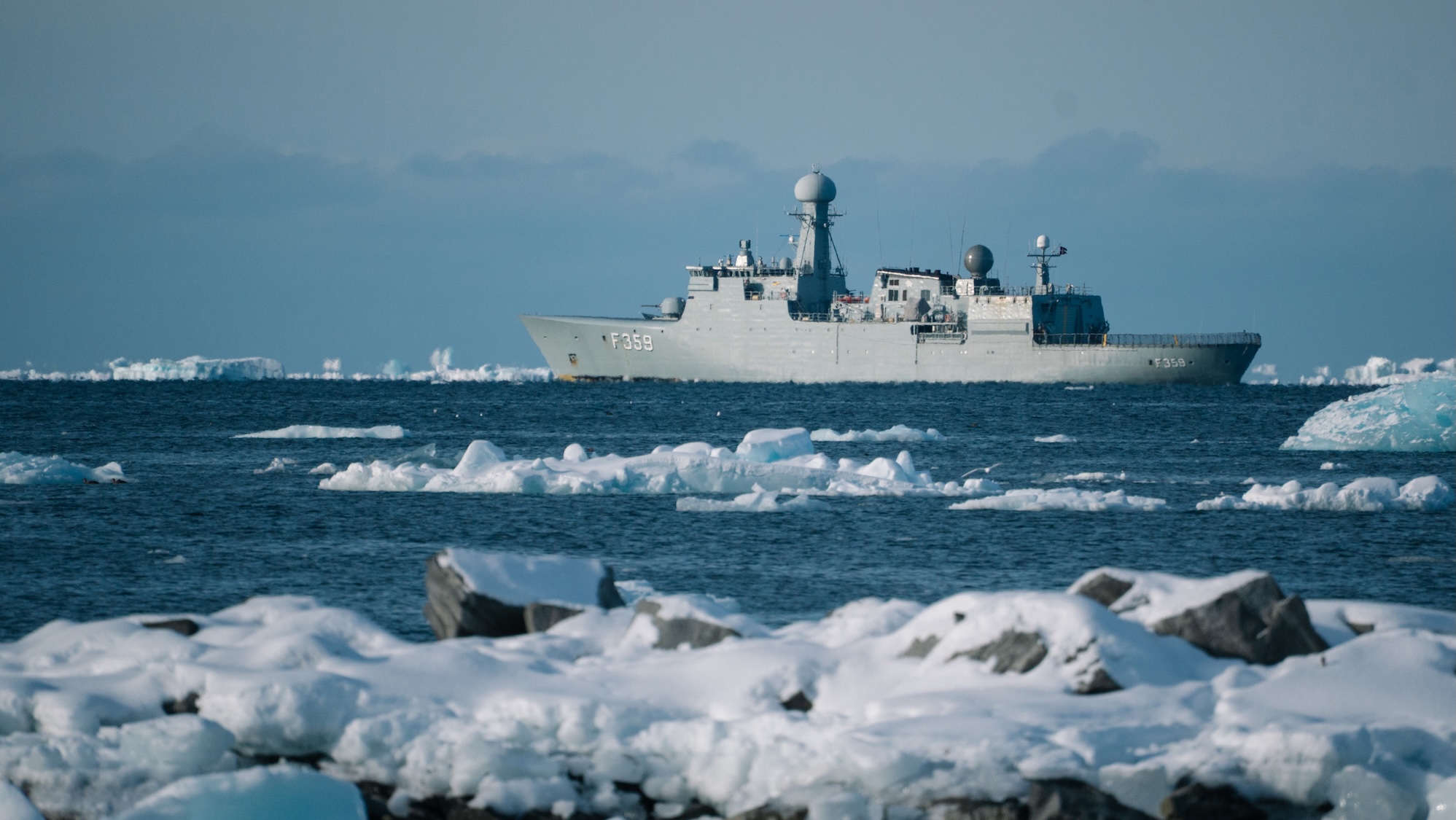How the Arctic became a geopolitical flashpoint
The UK is working with Nato allies in the Arctic Circle to prepare for potential Russian aggression

A free daily email with the biggest news stories of the day – and the best features from TheWeek.com
You are now subscribed
Your newsletter sign-up was successful
The Arctic is "fast becoming an area of intense focus for geopolitical competition", said Foreign Secretary David Lammy during his recent visit to the region.
Russia has long eyed control over the Arctic for its military and economic significance. During Lammy's visit to Norway and Iceland, he observed joint military exercises between the UK and Norway – a show of strength from Western allies in what is becoming an increasingly important strategic area.
Who owns the Arctic?
While no country owns the Arctic itself, there are eight countries whose territory extends into the Arctic Circle: Canada, Denmark, Norway, Russia, the US, Finland, Sweden and Iceland.
The Week
Escape your echo chamber. Get the facts behind the news, plus analysis from multiple perspectives.

Sign up for The Week's Free Newsletters
From our morning news briefing to a weekly Good News Newsletter, get the best of The Week delivered directly to your inbox.
From our morning news briefing to a weekly Good News Newsletter, get the best of The Week delivered directly to your inbox.
These countries are members of the Arctic Council, which acts as a forum for cooperation in the region, although Moscow has largely been sidelined since the invasion of Ukraine. None of them is able to stake a claim to the area, but they can operate in their respective exclusive economic zones, which extend 200 nautical miles from their coastlines. Within this radius, they are able to extract natural resources, fish and build offshore energy infrastructure, among other things.
Why is the region so important?
The Arctic is a frontier between Russia and Nato nations; in particular, it's the only direct boundary between the US and Russia – the maritime border through the Bering Strait – making control of the Arctic strategically important for both nations.
Its global significance, however, goes far beyond just military worth. The Arctic is sought-after for its shipping routes and wealth of natural resources. Climate change is warming the area and could, in time, make it possible for ships to pass directly over the North Pole.
That is a particular attraction to both Russia and China, who could significantly cut down the distance their ships need to travel for international trade. Beijing has, in recent years, declared itself a "near-Arctic state", said Modern Diplomacy, and laid out plans for a Polar Silk Road that passes through the Arctic.
A free daily email with the biggest news stories of the day – and the best features from TheWeek.com
The area also holds vast quantities of untapped natural resources, including oil and gas, making it an alluring prospect for the world's superpowers.
Why is interest intensifying now?
In the next five years, the Arctic region is likely to warm 3.5 times faster than the rest of the world, according to the UN's World Meteorological Organization. That means more routes are opening up for trade and military vessels, and more natural resources are becoming accessible as the ice melts.
Nato allies are also acutely aware of the threat posed by Russian aggression, and the strategic importance of not allowing military control of the Arctic to fall into Vladimir Putin's hands, giving him access to the North Atlantic.
Klaus Dodds, geopolitics professor at Royal Holloway, told Sky News that less sea ice in the Arctic will likely attract "heightened commercial and military activity by third parties that are not allies of the UK, primarily Russia and China".
With the US no longer a "reliable ally", Russia will "continue to target critical infrastructure in the North Atlantic and European Arctic – all of which may be ever more accessible".
What is the UK doing in the Arctic?
Since it invaded Ukraine, Moscow has increased its presence in the Arctic, "further heightening the risk of confrontation", said Lammy, which is why the UK is taking "action to deter threats".
That action has included naval patrols alongside Norwegian ships, as well as a new AI monitoring scheme in conjunction with Iceland that can detect hostile state activity, said The Telegraph.
The Foreign Office said it has already used sanctions to prevent a Turkish-built Russian floating dock, which could be used to repair its nuclear icebreaker fleet in the Arctic, from being towed to its destination, leaving it floating in the Mediterranean.
Richard Windsor is a freelance writer for The Week Digital. He began his journalism career writing about politics and sport while studying at the University of Southampton. He then worked across various football publications before specialising in cycling for almost nine years, covering major races including the Tour de France and interviewing some of the sport’s top riders. He led Cycling Weekly’s digital platforms as editor for seven of those years, helping to transform the publication into the UK’s largest cycling website. He now works as a freelance writer, editor and consultant.
-
 Is Andrew’s arrest the end for the monarchy?
Is Andrew’s arrest the end for the monarchy?Today's Big Question The King has distanced the Royal Family from his disgraced brother but a ‘fit of revolutionary disgust’ could still wipe them out
-
 Quiz of The Week: 14 – 20 February
Quiz of The Week: 14 – 20 FebruaryQuiz Have you been paying attention to The Week’s news?
-
 The Week Unwrapped: Do the Freemasons have too much sway in the police force?
The Week Unwrapped: Do the Freemasons have too much sway in the police force?Podcast Plus, what does the growing popularity of prediction markets mean for the future? And why are UK film and TV workers struggling?
-
 Vietnam’s ‘balancing act’ with the US, China and Europe
Vietnam’s ‘balancing act’ with the US, China and EuropeIn the Spotlight Despite decades of ‘steadily improving relations’, Hanoi is still ‘deeply suspicious’ of the US as it tries to ‘diversify’ its options
-
 The ‘mad king’: has Trump finally lost it?
The ‘mad king’: has Trump finally lost it?Talking Point Rambling speeches, wind turbine obsession, and an ‘unhinged’ letter to Norway’s prime minister have caused concern whether the rest of his term is ‘sustainable’
-
 Does standing up to Trump help world leaders at home?
Does standing up to Trump help world leaders at home?Today’s Big Question Mark Carney’s approval ratings have ‘soared to new highs’ following his Davos speech but other world leaders may not benefit in the same way
-
 Is the American era officially over?
Is the American era officially over?Talking Points Trump’s trade wars and Greenland push are alienating old allies
-
 Le Pen back in the dock: the trial that’s shaking France
Le Pen back in the dock: the trial that’s shaking FranceIn the Spotlight Appealing her four-year conviction for embezzlement, the Rassemblement National leader faces an uncertain political future, whatever the result
-
 Trump’s Greenland ambitions push NATO to the edge
Trump’s Greenland ambitions push NATO to the edgeTalking Points The military alliance is facing its worst-ever crisis
-
 Can Starmer continue to walk the Trump tightrope?
Can Starmer continue to walk the Trump tightrope?Today's Big Question PM condemns US tariff threat but is less confrontational than some European allies
-
 EU-Mercosur mega trade deal: 25 years in the making
EU-Mercosur mega trade deal: 25 years in the makingThe Explainer Despite opposition from France and Ireland among others, the ‘significant’ agreement with the South American bloc is set to finally go ahead